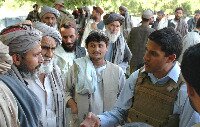Shah: 'We want real outcomes in health'
 Dr. Rajiv Shah |
Part two of the 8-part series In the Driver’s Seat: A Series on Country Ownership of Health Programs. Dr. Rajiv Shah was sworn in as the 16th Administrator of the United States Agency for International Development (USAID) on December 31, 2009. He spoke with John Donnelly earlier this month.
Q: What does country ownership mean?
A: I think it primarily means the country owning and defining the set of priorities in terms of what they want to accomplish in the health sector. It will vary country by country and vary based on disease, and it will vary on different country governments and their prioritization of health problems. It’s fundamentally about saying in the last decade that there’s been this huge growth in global health, with a lot of the work being done by NGOs, contract partners, and foundations that sometimes operate outside the dialogue and engagement with the host country. If we are going to achieve progress at a higher level, and ensure that countries sustain these achievements, then we need to make this whole system of donor-supported global health activities fit within a country’s own set of aspirations for global health. We’ve now seen a lot of different models for countries to express their priorities. The ones I prefer are inclusive of civil society and other groups within those countries.
Q: Why hasn’t there been US government participation in pool funding arrangements?
A: USAID not only participates in them, but has built mechanisms that allow multiple partners to align investments. We have done this in Sudan, Pakistan, Afghanistan, Senegal, and Haiti, so there are a lot of different places where we have taken a significant portion of our investment and used it in pool funding arrangements. In other cases, we have (pooled funds) in multilateral investments like the Global Fund and GAVI. But our goal is not going to be defined by the funding arrangement or the funding mechanism used. What we’re looking for is to build real outcomes in health. It might be a 50 percent reduction in diarrheal disease because of the use of a rotavirus vaccine. It might be to save more women’s lives in childbirth by providing more support to training skilled (health) providers. We have just started a new set of reforms that will enable our teams to do much more direct assistance and direct support to pool funding mechanisms.
Q: What about the fear that these arrangements will lead to more corruption?
A: That’s the risk. There are lots of additional risks. There are risks of misappropriated funds, of corruption, of poor and sloppy implementation. If there isn’t strong intellectual leadership, people won’t make tough decisions that need to be made. The way we manage those risks, and how we manage these relationships, is by having a seat at the table. We track US taxpayer dollars very closely. We think it’s about having clear goals, being sophisticated about (monitoring the) operation, and working with others, too, that allows for country ownership, real dialogue, and shared commitment.
Q: Will new types of funding arrangements become the model for future development assistance in order to make more progress on targets such as the Millennium Development Goals?
A: These types of arrangements can go a long way to streamline and improve coordination among donors, and among partners, and allow for more coherence and efficiency. But to achieve the MDG goals you have to seriously innovate and develop solutions that can reach many, many more people at a unit cost that is more affordable. In order to reach the goal to reduce mortality among children by two-thirds, we know we are going to need (more distribution) of pneumococcal and rotavirus vaccines. If we are going to achieve the MDGs in maternal health, we need a new way of training community health workers as well as introducing new mobile technologies into a more structured medical system that provides more service capability and saves more lives. They are doing it in Senegal now with the training of 9,800 community health workers. That’s the kind of scale you need in order to achieve large-scale results. In HIV/AIDS, you are never going to achieve real success with that epidemic unless we have large-scale prevention innovation, and use new strategies such as microbicides that allow women to reduce the transmission risk. Coordination and pooling are great in increasing efficiency, but you also need innovation.
In the Driver’s Seat: A Series on Country Ownership of Health Programs
Part 1: WHO's Chan: 'Some countries are angry'
Part 3: Ethiopia’s Tedros: No ownership, no scale
Part 4: Wisman: Donors need to `take a little risk’
Part 5: Omaswa from Uganda: `Donors want a controlling say’
Part 6: From Nepal: `We build step by step’
Part 7: From Mali: `We have a lot of control now’
Keyword Search
MLI works with ministries of health to advance country ownership and leadership. This blog covers issues affecting the ministries and the people they serve.
Connect with Us
![]()
![]()
Categories
Blogs We Like
- Africa Can End Poverty
- Africa Governance Initiative
- Behind the Numbers
- CapacityPlus
- Center for Global Health R&D Policy Assessment
- Center for Global Development: Global Health Policy
- Center for Health Market Innovations
- Global Health
- Global Health Hub
- Global Health Impact
- The New Security Beat
- PAI Blog
- RH Reality Check
- Save the Children
- Transparency and Accountability Program
Contact Us
Please direct all inquiries to

Comments